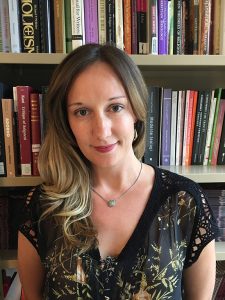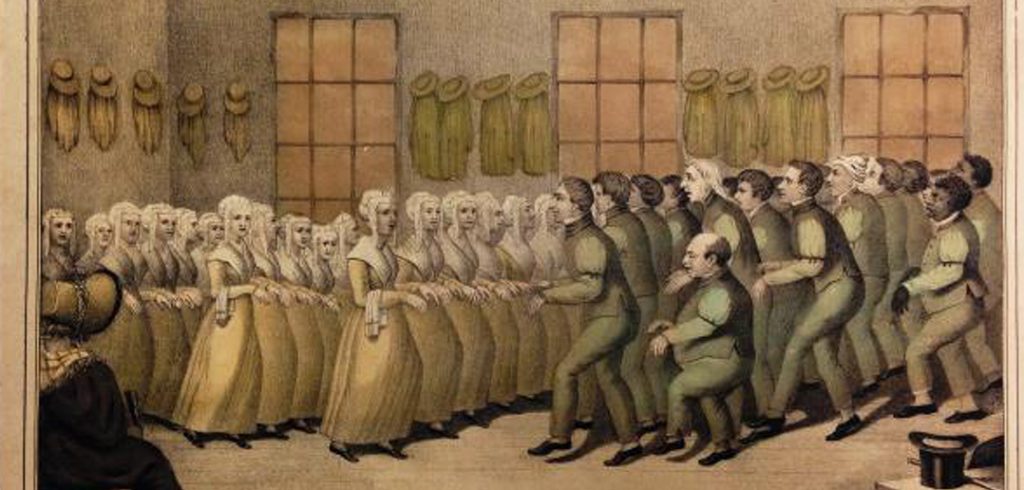The United Society of Believers in Christ’s Second Appearing, commonly known as the Shakers, was one of the most successful and long-lived utopian societies in America. But if they are remembered at all today, it is largely for their simple, exquisitely constructed furniture, examples of which are on display in places such as the Metropolitan Museum of Art.
Kathryn M. Reklis, an assistant professor of theology, is poised to study the religious group, thanks to a $50,000 grant from the Henry Luce Foundation’s Theology Program to Fordham University. The grant, a companion to a larger grant that the Luce Foundation’s American Art Program awarded to the Shaker Museum | Mount Lebanon, is geared toward exploring the experiential and communal aspects of Shakerism.
A Unique Take on the Spirit Within
“The choices that the Shakers made about the kinds of furniture they made were part of their larger theological ideas about the dwelling of the spirit inside each and every human being,” Reklis said.

“They also created radical social experiments. They were very gender egalitarian for their time, their communities were run equally by men and women, they undertook very progressive education experiments, and they created experiential communes that encouraged the spiritual awakening and insight of all their members.”
Lacy Schutz, executive director of the museum, will co-direct the project with Reklis. Together they are recruiting eight Fellows for the project. They will convene two conversations at Fordham and one at the Shaker Museum, beginning this fall and running through fall 2019.
Confirmed Fellows include:
Courtney Bender, Ph.D., professor of religion at Columbia University
Ashon Crawley, Ph.D., assistant professor of religious studies and African American and African Studies at the University of Virginia
Lesley Dill, artist
Carter Foster, Deputy Director for Curatorial Affairs and Curator of Prints and Drawings, Blanton Museum
David Leslie, executive director of the Rothko Chapel
Maggie Taft, Independent Scholar/Haddon Avenue Writing Institute
When complete, the group will share their findings through a to-be-determined means, such as a symposium, an art show, or a series of academic essays.
“This project is bringing together religious studies scholars, theologians, art historians, scholars of material culture, practicing artists, and museum professionals both to understand more about the Shakers themselves, but also to think about the question, how do we make public knowledge about a group like the Shakers? We want to explore how artists, academics, and museum professionals all contribute to how we understand the relationship between religion and art,” Reklis said.
“What do you do with the legacy of a group like this? It’s not just the purview of a tiny little group of specialist scholars.”
Artists and Theologians in Conversation
In her research, Reklis has explored questions about embodiment and ecstatic Protestantism. As a co-founder of the Institute for Art, Religion and Social Justice at Union Theological Seminary, she brought artists and theologians into public conversation. But the Shakers are a relatively new area of that research, which she says makes the project even more exciting.
“Our goal at the Institute (for Art, Religion and Social Justice) was to bring practicing artists and religious professionals into conversation about social justice. I’ve spent a lot of time in conversations across the art and theology worlds,” she said.
“That work was so meaningful to me, and the most exciting part of this new project is the partnership with the Shaker Museum.”
Over the course of the three meetings, the Fellows will work with the Shaker Museum’s extensive collection of Shaker material culture and will think with Lacy Schutz and the museum leadership about how to incorporate the mission and spirit of the Shaker experiments into the museum’s work itself.
Shaker Museum | Mount Lebanon (shakerml.org) is dedicated to preserving the history of the Shakers, including their furniture and architecture as well as their values of inclusion, innovation, integrity, and conviction. It stewards the historic site in New Lebanon, New York, which is open year-round for recreation and self-guided tours, and offers tours, exhibitions, and public programs seasonally. The museum also has a campus in Old Chatham, New York, open year-round by appointment, where the administrative offices, collections, library, and archives are housed. The museum’s collection of over 56,000 Shaker items is the most comprehensive collection of its kind in the world.

